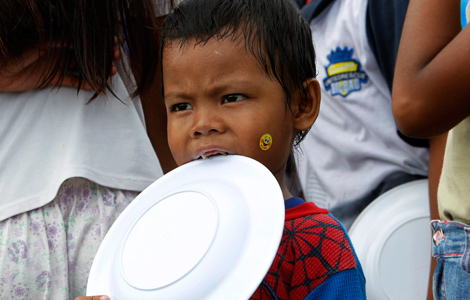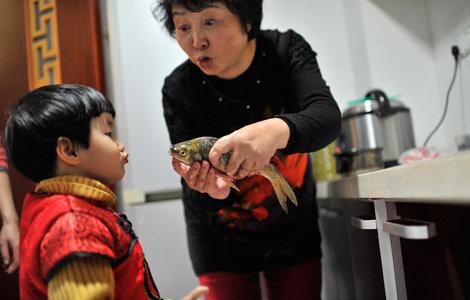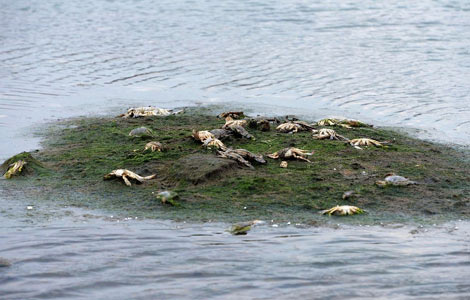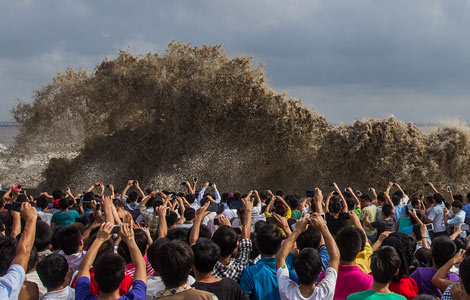Disdain for Japan on the rise in ROK: poll
Updated: 2013-12-25 00:22
By ZHAO YANRONG and REN QI (China Daily)
|
||||||||
Republic of Korea citizens have a growing animosity for Japan due to the two countries' territorial and historical issues, a recent survey in the ROK showed.
But the United States, an ally of both the ROK and Japan, expects the ROK to increase its cooperation with Japan regardless of their differences to deal with increasing tensions in the Korean Peninsula, experts said.
According to a report on Tuesday by Yonhap, the ROK's largest news agency, an officer at the US Defense Department said the ROK should set aside its differences with Japan to improve their security cooperation.
The Washington-based senior officer said the joint military exercises between the US, Japan and ROK are becoming more frequent, and their cooperation is growing. For instance, the three countries conducted joint anti-piracy exercises in the Gulf of Aden early this month.
The ROK's peacekeepers in South Sudan will receive 10,000 rounds of ammunition from Japan via the United Nations to beef up their defensive capabilities amid the intensifying conflict in the fledgling African nation.
While tensions in the Korean Peninsula are increasing, the ROK government may change its original position, set aside historical issues with Japan to increase regional security cooperation as the US expects, Yonhap reported.
Because Japan and the ROK both are US allies, a better relationship between Seoul and Tokyo is good for the US' rebalancing strategy in the Asia-Pacific region, said Shi Yuanhua, director of the Center for Korean Studies under the Institute of International Studies of Fudan University in Shanghai.
"It's not the first time the US has pushed Seoul to establish an alliance with Tokyo despite the historical issues, and the US will push more for its own interests in the future," he said.
However, it is unlikely that ROK will set aside those issues to become a real security partner of Japan, he said.
"The ROK has territorial disputes with Japan, and Japan has not responded properly to issues like ‘comfort women' (World War II-era sex slaves) and Japanese history textbooks" that downplay Japanese aggression in the war and Japan's 35-year occupation of the Korean Peninsula.
"Establishing an alliance with Japan means the ROK must give up its own national interests based on those issues, which the ROK's people will not accept," he said.
Shi Yongming, a researcher of Asia-Pacific studies at the China Institute of International Relations, said the ROK government has two main regional strategies — acting as the mediator between China and US in the region, and seeking reconciliation with the Democratic People's Republic of Korea.
"But neither of the strategies requires Tokyo's participation," he added.
Japan Daily Press reported on Monday that Japan scored just 2.57 points on a scale of zero to 10 in a survey that evaluated ROK people's positive feelings toward the country. Japan's total was barely above the DPRK's 2.37 points, according to the survey, conducted by Research & Research, an ROK market information company.
The decline of warm feelings toward Japan is attributed mostly to the Japanese government's perceived tilting to the extreme right under Japanese Prime Minister Shinzo Abe.
This year, ROK residents took offense at Japan's renewed claims to the ROK-controlled Dokdo Islets, which Tokyo calls the Takeshima Islands. There was also a lot of unhappiness about Japanese politicians' visits to the controversial Yasukuni Shrine, which honors Japanese war dead — including World War II war criminals.
All of these events have led a larger number of ROK citizens to see Japan as a rival rather than a partner — 66.2 percent this month.
Contact the writers at zhaoyanrong@chinadaily.com.cn and renqi@chinadaily.com.cn
Most Viewed
Editor's Picks

|

|

|

|

|

|
Today's Top News
Judge won't keep brain-dead girl on ventilator
Delicious, festive holiday choices abound for expats
Shanghai to soar on FTZ wings
Visa reform urged for China
Mend ties, top adviser tells Tokyo
Experts defend hepatitis B program
Tight budgets of the elderly cause issues
Caregivers in high demand
US Weekly

|

|















